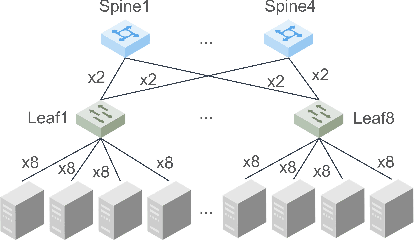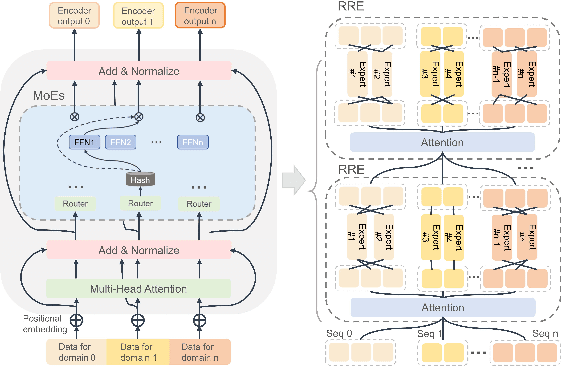Rongqian Zhao
LocMoE+: Enhanced Router with Token Feature Awareness for Efficient LLM Pre-Training
May 24, 2024Abstract:Mixture-of-Experts (MoE) architectures have recently gained increasing popularity within the domain of large language models (LLMs) due to their ability to significantly reduce training and inference overhead. However, MoE architectures face challenges, such as significant disparities in the number of tokens assigned to each expert and a tendency toward homogenization among experts, which adversely affects the model's semantic generation capabilities. In this paper, we introduce LocMoE+, a refined version of the low-overhead LocMoE, incorporating the following enhancements: (1) Quantification and definition of the affinity between experts and tokens. (2) Implementation of a global-level adaptive routing strategy to rearrange tokens based on their affinity scores. (3) Reestimation of the lower bound for expert capacity, which has been shown to progressively decrease as the token feature distribution evolves. Experimental results demonstrate that, without compromising model convergence or efficacy, the number of tokens each expert processes can be reduced by over 60%. Combined with communication optimizations, this leads to an average improvement in training efficiency ranging from 5.4% to 46.6%. After fine-tuning, LocMoE+ exhibits a performance improvement of 9.7% to 14.1% across the GDAD, C-Eval, and TeleQnA datasets.
LocMoE: A Low-overhead MoE for Large Language Model Training
Jan 25, 2024



Abstract:The Mixtures-of-Experts (MoE) model is a widespread distributed and integrated learning method for large language models (LLM), which is favored due to its ability to sparsify and expand models efficiently. However, the performance of MoE is limited by load imbalance and high latency of All-To-All communication, along with relatively redundant computation owing to large expert capacity. Load imbalance may result from existing routing policies that consistently tend to select certain experts. The frequent inter-node communication in the All-To-All procedure also significantly prolongs the training time. To alleviate the above performance problems, we propose a novel routing strategy that combines load balance and locality by converting partial inter-node communication to that of intra-node. Notably, we elucidate that there is a minimum threshold for expert capacity, calculated through the maximal angular deviation between the gating weights of the experts and the assigned tokens. We port these modifications on the PanGu-Sigma model based on the MindSpore framework with multi-level routing and conduct experiments on Ascend clusters. The experiment results demonstrate that the proposed LocMoE reduces training time per epoch by 12.68% to 22.24% compared to classical routers, such as hash router and switch router, without impacting the model accuracy.
 Add to Chrome
Add to Chrome Add to Firefox
Add to Firefox Add to Edge
Add to Edge